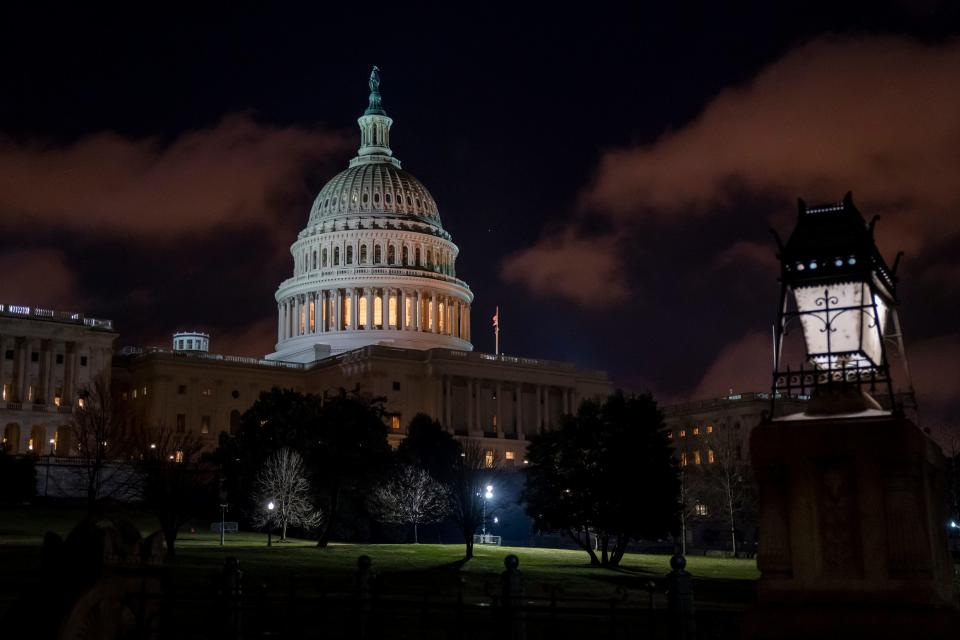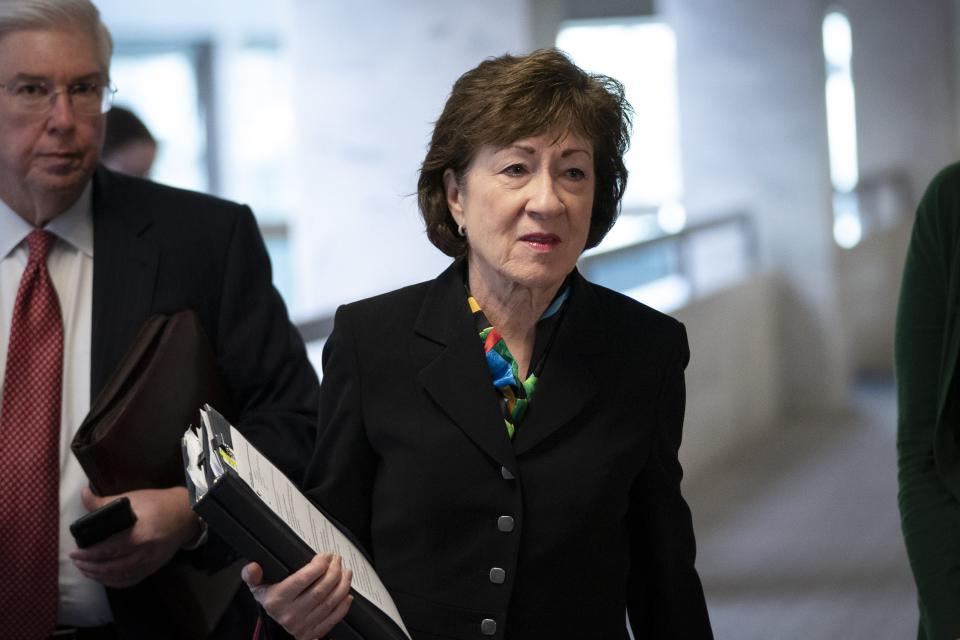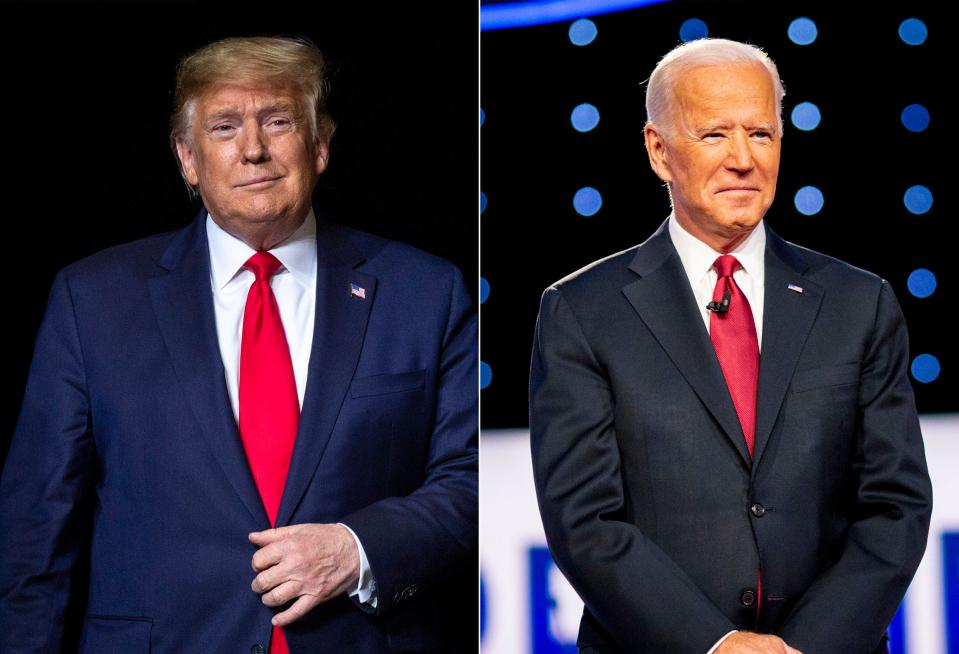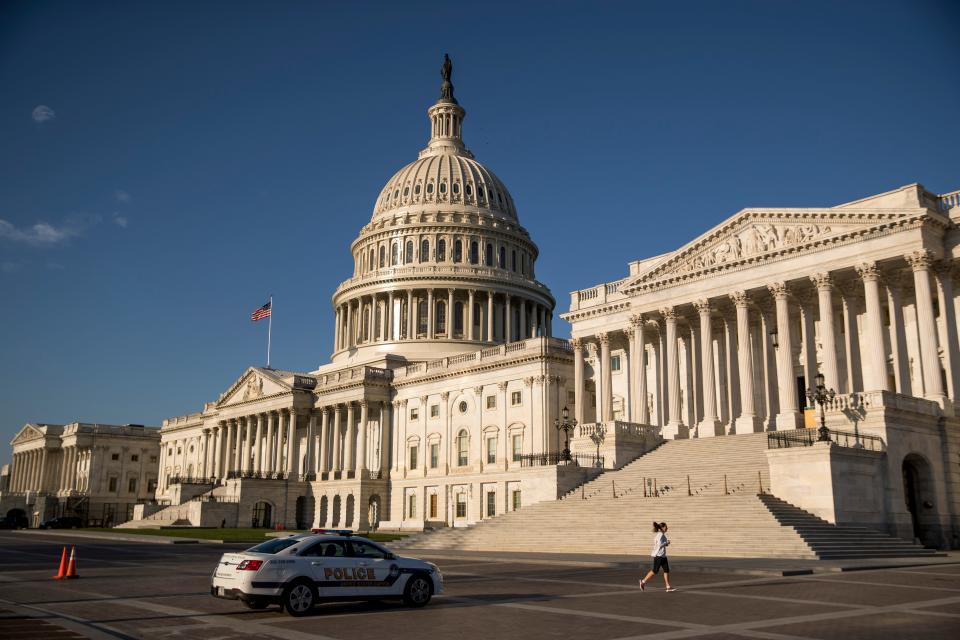Even Senate races have caught COVID-19, boosting Democrats' chances of winning control of the chamber
Now, even Senate races have caught COVID-19.
Side effects of the pandemic, especially the damage it has done to President Donald Trump's political standing, have contributed to a tectonic shift in the landscape for Senate contests this fall. That has boosted once-distant Democratic prospects to claim a majority after six years of Republican control.
The gain of three or four seats that Democrats need is a target that analysts in both parties now say is in reach, at least at the moment.
Since January, when the novel coronavirus was first seen as a global health threat, the political outlooks for eight Republican senators running for re-election have worsened, according to rankings by the nonpartisan "Cook Political Report." Now, nine GOP-held seats are rated as competitive or tossup, compared with two Democratic-held seats.
‘Grim resolve’: Biden is up big and the Senate is in sight, but Democrats still haunted by fear of letdown

In some states, the pandemic has had particular effects. In North Carolina, Republican Sen. Thom Tillis faces criticism from Democrats about the repercussions amid the crisis of his role in blocking Medicaid expansion when he was speaker of the state House of Representatives. In Montana, Democratic Senate challenger Steve Bullock has been strengthened in a close contest thanks to media attention on the generally good marks he's gotten for handling the coronavirus in his present job as governor.
Bullock's first TV commercial featured him wearing a protective face mask.
"The current political environment is definitely challenging for Republican chances of holding a Senate majority," said Tim Cameron, the chief digital strategist at the GOP Senate campaign arm in 2014 and 2016, when Republicans gained and then held control. Nevada Sen. Catherine Cortez Masto, chair of the Democratic Senate campaign arm, said, "I will say, we are on a pathway to hold the Senate, there's no doubt about it."
She said the coronavirus crisis has intensified voters' concerns about the availability and cost of health care, something many Democratic candidates already were emphasizing.
Go big or play it safe?: Electoral map widens for Biden and Democrats, but with risk
Key Senate battlegrounds in swing presidential states
COVID-19 doesn't have a partisan predisposition, but it has hurt Trump, as two-thirds of Americans now disapprove of the job he has done in responding to the crisis, according to an ABC-Ipsos Poll released Friday. What's more, the disease's devastating impact on jobs and growth has cost the president and other GOP candidates their biggest political selling point: a booming economy.
"Trump is driving the narrative," Jessica Taylor, Senate editor at The Cook Political Report, said in an interview. "We see voters have really soured on President Trump and his performance, and Senate Republicans are feeling that down-ballot."
A party's congressional candidates often find their fortunes tied to the presidential nominee, and those ties have been hardened this year as Trump's control of the GOP is largely unchallenged. He has reshaped the Republican Party in his image on such defining issues as trade, immigration and race, and he hasn't hesitated to punish fellow Republicans who criticize him.
This year, eight of the 11 competitive Senate races are in states that are seen as at least potential battlegrounds in the presidential race: Arizona, Colorado, Georgia, Iowa, Maine, Michigan and North Carolina. (History says that matters. In 2016, every Senate race in the country was won by the party that carried the state in the presidential race.)
What's more, several of the Senate battlegrounds are in states that have been particularly hard-hit by the pandemic, including Arizona and Georgia.
The repercussions of a Democratic takeover of the Senate would be enormous, especially as optimism about the party's chances of winning the White House grows. A Democratic Senate would be much more likely to enact the sweeping initiatives that the party's presumptive presidential nominee, Joe Biden, is now preparing to submit if he wins. It would improve prospects for progressive legislation that has passed the Democratic-controlled House only to be stalled in the Senate.
"A legislative graveyard," Cortez Masto said.
The Senate also has final say over the confirmation of senior officials in federal agencies and members of the federal judiciary, including Supreme Court justices.
Kansas? Really? It's been 88 years
A political landscape that has been reshaped in the past six months could change again in the next 3½ months. To claim a majority, Democrats need to score a net gain of three seats if the party wins the White House, because the vice president can break ties in the Senate. If Trump wins re-election, Democrats need a net gain of four seats.
Here's where things stand now:
Among Democratic incumbents, Sen. Doug Jones faces an uphill re-election fight in solidly red Alabama. In the Tuesday primary, former Auburn football coach Tommy Tuberville defeated former Trump Attorney General Jeff Sessions for the Republican nomination against Jones.
Among Republican incumbents, five senators are now given no better than even chances of holding their seats, according to statewide polls and independent analysts. They are Susan Collins of Maine, Steve Daines of Montana, Cory Gardner of Colorado, Martha McSally of Arizona, and Tillis.
In another four GOP-held seats, Republican candidates are favored, but not by much. They include Sens. Joni Ernst of Iowa, David Perdue of Georgia and Kelly Loeffler, running in a Georgia special election. Most surprising of all, the open Senate race in Kansas is rated as only "leaning" to the GOP.

The last Democrat to win a Senate election in Kansas? That would be George McGill, in 1932. The Republicans' unbroken hold on Kansas' Senate seats is the longest for either party in any state.
The odds of a Democratic victory in the Sunflower State will depend on which candidate wins the Republican nomination in the Aug. 4 primary. Former Kansas Secretary of State Kris Kobach, a firebrand conservative who lost the governor's race in 2018, is seen as a more vulnerable standard bearer than rival Roger Marshall, now a member of the U.S. House. The Democratic nominee is expected to be state Sen. Barbara Bollier, who switched her party registration from the GOP in 2018.
November elections: As Trump, Biden battle, officials are running out of time, money

More moderate and establishment Democratic contenders have generally prevailed in this year's primaries over more progressive alternatives, including in Kentucky (Amy McGrath), Colorado (John Hickenlooper) and Iowa (Theresa Greenfield). That happened again in Tuesday's primary in Texas, where Air Force veteran M.J. Hegar defeated Royce West for the nomination to challenge Sen. John Cornyn.
Democrats have touted the possibility of upset victories in some high-profile Senate races, especially against Senate Majority Leader Mitch McConnell in Kentucky. In South Carolina, Democrat Jaime Harrison, challenging Republican Sen. Lindsey Graham, raised an impressive $13.9 million over the past three months. .
Those expanding ambitions may prove to be a mistake by Democrats, Cameron cautioned.
"Democrats do risk getting spread thin, with potentially a dozen races being contested at the multi-million dollar level," he said. If the political environment improves for Republicans, "they'll regret not having that money" to use in the tightest contests.
Money matters more with COVID-19
One more effect of COVID-19: Money matters even more than usual.
Traditional campaign rallies have become all but impossible to stage because of the risk that crowded venues become "super spreader" events for the coronavirus. Even door-to-door campaigning by candidates and field workers is problematic at a time millions of Americans are leery of contact with anyone outside their households.
That has made TV and online advertising, and the funds to pay for them, more crucial than ever. Democratic Senate challengers in competitive races have shown more strength than their Republican opponents in cultivating small donors on digital platforms, a significant asset.
More: Facebook clashes with election officials behind the scenes over policies, misinformation

That may be demonstrated by midnight Wednesday, when fundraising reports for the second quarter of the year are due to the Federal Election Commission.
Already, Democratic candidates in five of the 11 competitive Senate races have reported raising more money than their Republican opponents, in some cases even against incumbents. In Arizona, Democratic challenger Mark Kelly has outraised McSally by more than $12 million. In Maine, Democratic challenger Sara Gideon, who formally won the nomination in Tuesday's primary, has outraised Collins by nearly $7 million.
"It's a very unique and challenging environment, given that we've all been faced with a once-in-a-lifetime global pandemic that has caused a significant health crisis and economic turmoil." acknowledged Jesse Hunt, a spokesman for the National Republican Senatorial Committee. But he added, "Republican senators are in a great position to draw contrasts with their Democratic opponents and close strong over these next three-and-a-half months."
"I think it's pretty even at this point," Taylor said, "but it's tilting toward Democrats."
Republican RSVPs: Several senators say they will not attend GOP convention as COVID-19 cases in Florida spike
This article originally appeared on USA TODAY: Democrats could win Senate as Trump's COVID-19 response reshapes races

